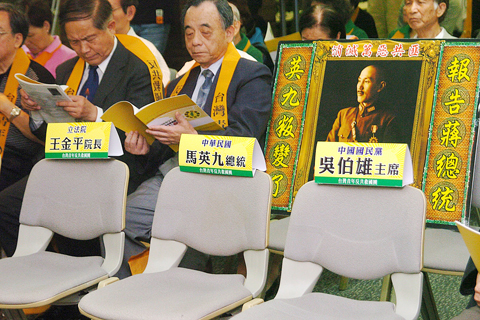Democratic Progressive Party (DPP) Chairperson Tsai Ing-wen (蔡英文) yesterday joined the newly established Taiwan Youth Anti-Communist Corps (台灣青年反共救國團).
“The establishment of the Taiwan Anti-Communist Youth Corps highlighted the fact that the Chinese Nationalist Party [KMT] owes Taiwanese an explanation for why it was anti-Communist before but is now leaning toward China to such a degree? Why such a turn-around? Where is Taiwan’s destiny under the KMT’s radical change?” Tsai asked, making a reference to the China Youth Anti-Communist Nation Salvation Corps (中國青年反共救國團) established by then-premier Chiang Ching-kuo (蔣經國) on Oct. 31, 1952.
China Youth Anti-Communist Nation Salvation Corps upheld anti-communist doctrines and organized military training camps for high school, college and university students.

PHOTO: CHIEN JUNG-FONG, TAIPEI TIMES
It later changed its name to China Youth Nation Salvation Corps (中國青年救國團) on Oct. 31, 2000, and transformed itself into a private organization aimed at guiding youth in their growth and development.
Tsai said yesterday that when she was a college student, she had joined a hiking program sponsored by the China Youth Anti-Communist Nation Salvation Corps.
Political commentator Paul Lin (林保華), who established the new group, said its aim was to help Taiwanese uphold the nation’s sovereignty by gaining a clear understanding of China’s nature.
“It can be confusing for some to compare the China Youth Anti-Communist Nation Salvation Corps of fifty years ago to today’s Taiwan Youth Anti-Communist Corps,” said former premier Su Tseng-chang (蘇貞昌), who also attended yesterday.
“At the time, the KMT popularized slogans about ‘terminating the evil communists,’ but it now leans toward China,” Su said. “That confuses Taiwanese.”
ADDITIONAL REPORTING BY RICH CHANG
Also See: An ironic group to fight the CCP

Alain Robert, known as the "French Spider-Man," praised Alex Honnold as exceptionally well-prepared after the US climber completed a free solo ascent of Taipei 101 yesterday. Robert said Honnold's ascent of the 508m-tall skyscraper in just more than one-and-a-half hours without using safety ropes or equipment was a remarkable achievement. "This is my life," he said in an interview conducted in French, adding that he liked the feeling of being "on the edge of danger." The 63-year-old Frenchman climbed Taipei 101 using ropes in December 2004, taking about four hours to reach the top. On a one-to-10 scale of difficulty, Robert said Taipei 101

Taiwanese and US defense groups are collaborating to introduce deployable, semi-autonomous manufacturing systems for drones and components in a boost to the nation’s supply chain resilience. Taiwan’s G-Tech Optroelectronics Corp subsidiary GTOC and the US’ Aerkomm Inc on Friday announced an agreement with fellow US-based Firestorm Lab to adopt the latter’s xCell, a technology featuring 3D printers fitted in 6.1m container units. The systems enable aerial platforms and parts to be produced in high volumes from dispersed nodes capable of rapid redeployment, to minimize the risk of enemy strikes and to meet field requirements, they said. Firestorm chief technology officer Ian Muceus said

MORE FALL: An investigation into one of Xi’s key cronies, part of a broader ‘anti-corruption’ drive, indicates that he might have a deep distrust in the military, an expert said China’s latest military purge underscores systemic risks in its shift from collective leadership to sole rule under Chinese President Xi Jinping (習近平), and could disrupt its chain of command and military capabilities, a national security official said yesterday. If decisionmaking within the Chinese Communist Party has become “irrational” under one-man rule, the Taiwan Strait and the regional situation must be approached with extreme caution, given unforeseen risks, they added. The anonymous official made the remarks as China’s Central Military Commission Vice Chairman Zhang Youxia (張又俠) and Joint Staff Department Chief of Staff Liu Zhenli (劉振立) were reportedly being investigated for suspected “serious

Nipah virus infection is to be officially listed as a category 5 notifiable infectious disease in Taiwan in March, while clinical treatment guidelines are being formulated, the Centers for Disease Control (CDC) said yesterday. With Nipah infections being reported in other countries and considering its relatively high fatality rate, the centers on Jan. 16 announced that it would be listed as a notifiable infectious disease to bolster the nation’s systematic early warning system and increase public awareness, the CDC said. Bangladesh reported four fatal cases last year in separate districts, with three linked to raw date palm sap consumption, CDC Epidemic Intelligence